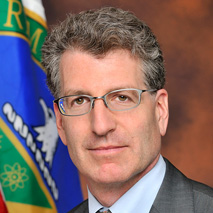In Hugoton, Kansas, a state-of-the-art biorefinery has begun producing 25 million gallons per year of cellulosic ethanol.
Office of Energy Dominance Financing
October 17, 2014
Secretary Moniz (center) tours the Abengoa Biorefinery in Hugoton, Kansas.| Photo Courtesy of Abengoa.
Today, we joined Energy Secretary Moniz at the grand opening of the nation’s third commercial-scale cellulosic ethanol biorefinery in the heart of rural America.
The Abengoa Bioenergy Biomass of Kansas facility in Hugoton, Kansas, is hours away from the nearest major airport and nearly an hour drive from the closest town. The journey to get here took a long time and a lot of coordination, but it was worth it -- because this project represents a major milestone for bioenergy in the United States. This second-generation plant uses a proprietary process that turns cellulosic biomass into fermentable sugars that are then converted into transportation fuels.
The Abengoa plant is designed to produce up to 25 million gallons per year of cellulosic ethanol from non-edible corn stalks, stems and leaves, harvested within a 50-mile radius of the plant. The state-of-the-art facility will feature an electricity cogeneration component that will generate up to 21 megawatts of electricity -- enough to power the plant and provide excess clean, renewable power to the local community. This project is an ideal example of the Department of Energy’s coordinated efforts along the path to commercialization.
Achieving commercial deployment for this innovative technology, much like the journey to get to Hugoton, has taken time and coordination. Starting in 2003, the Department’s Office of Energy Efficiency and Renewable Energy (EERE) provided Abengoa with an $18 million cost-shared grant to construct a pilot plant in Nebraska intended to improve and demonstrate the company’s innovative biochemical conversion technology. Since then, EERE has provided $99 million in cost-sharing grants to Abengoa for catalyst development, temperature and pressure reduction, engineering, design and construction.
Sponsors of innovative technology projects like this often have difficulty obtaining private debt financing because such projects have never been deployed on a commercial scale in the United States. To help close this commercial financing gap, the Department’s Loan Programs Office issued Abengoa a $132 million loan guarantee in 2011 to support the construction of the biorefinery.
The Department has played an important role in advancing this industry by supporting bioenergy conversion technology development from the lab to initial commercial-scale deployment.
The Abengoa plant will be one of three pioneering cellulosic ethanol facilities developed in public-private partnership with the Department to begin production at commercial-scale since July 2013. Last month, Project LIBERTY in Emmetsburg, Iowa, opened its doors, becoming the nation’s second commercial-scale cellulosic ethanol biorefinery. It is designed to produce 25 million gallons of cellulosic ethanol per year.
EERE has worked in partnership with cellulosic ethanol facilities since 2007 and contributed almost $250 million to support their construction and technical development. Once they are fully operational, EERE-supported facilities will have a combined production capacity of more than 50 million gallons of cellulosic ethanol per year.
The success of these facilities is helping to reduce technology risk and cultivate commercial financing in bioenergy—and we’re thankful to our forward-looking industrial partners for their innovative efforts to bring new clean energy technologies to market.
The path to commercializing innovation takes time and patience. But with the Department’s investments, we are helping to accelerate the journey. In the long run, the Department’s early involvement will set the stage for a lasting and vibrant bioenergy industry. The benefits for the United States -- energy security, economic opportunities in rural America and a low-carbon energy future -- are definitely worth the effort.


